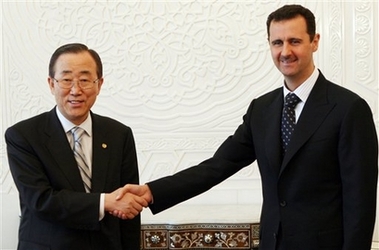| Home / Middle East Peace Process / Lebanon-Syria | Tools: Save | Print | E-mail | Most Read |
| UN Chief Seeks Syria's Support on Lebanese Issue |
| Adjust font size: |
Visiting UN Secretary General Ban Ki-moon on Tuesday held talks with Syrian President Bashar al- Assad in a bid to seek his support on the Lebanese issue, particularly on an international tribunal on the assassination of former Lebanese premier Rafik Hariri and efforts to stop illegal arms smuggling into Lebanon.
"I discussed the special tribunal at length with the president, " Ban told reporters after meeting Assad, saying that he requested Syria to exert influence in order to have the Lebanese people to reach an agreement in this regard. Rival parties' leaders in Lebanon have been in disagreement over the formation of the tribunal, which is the worst political split in the country since its 1975-1990 civil war. Ban said he emphasized the importance and the urgency for the Lebanese people to promote national reconciliation and reach an agreement for the formation of the tribunal. "Neighboring countries, particularly Syria, should play a constructive role to help this national reconciliation," said Ban. Ban said Assad responded that "this is an issue purely the Lebanese people should decide with consensus opinion, ... he said at the same time he would use his efforts to encourage the Lebanese people to arrive at national consensus." Ban added that Assad said Damascus would support "whatever the Lebanese agree on" regarding the tribunal. The UN chief, meanwhile, implied that the United Nations might take a decision on its own if pro-and anti-Syrian factions in Beirut cannot reach an agreement in this regard. "If they are not able to agree on that, this is something the United Nations, particularly the Security Council, will have to consider," Ban said, adding "I'm not in a position to say something other than that." Syria has been accused of implication in Hariri's killing, an allegation it strongly denied, and insists to try any Syrians at home if they were involved. The Syrian government has also objected the move to set up the tribunal before a UN commission ended its inquiry into the killing. Meanwhile, the UN chief said he also discussed with Assad the illegal movements of arms into Lebanon while urging Syria to establish diplomatic relations and reach a border agreement with Lebanon. "I emphasized the importance of preventing the illegal movements of arms into Lebanon," said Ban, noting that Syria can play a "very positive role" in Lebanon, including assisting in disarming and disbanding all armed groups there. The UN Security Council authorized this month a mission to check reports of weapons smuggling from Syria into Lebanon, especially to the Lebanese Shiite movement of Hezbollah, which enjoys Syria's support. Assad reaffirmed his readiness to establish diplomatic relations with Lebanon and agreed to reactivate the border committee with Lebanon for the demarcation of the borders, added the UN chief. Syria, a former power-broker in Lebanon, was forced to withdraw its troops from there after a 29-year military presence in 2005 following Hariri's murder. At the same time, Ban said he exchanged views with Assad on reviving the Middle East peace process according to an Arab peace initiative revived at the Arab summit held late March in Saudi Arabia, saying he expected Syria to play an important role in achieving peace and stability in the region. Ban stressed that Israel should return all occupied Arab territories, including Syria's Golan Heights, in accordance with relevant UN resolutions. Ban also expressed appreciation to Syria's "generous accommodation" of the Iraqi refugees who have presented "a big challenge" to the Syria n government politically, socially and economically. He called on the international community to help reduce the heavy burden by Iraq's neighbors, especially Syria and Jordan, in this regard. According to the official SANA news agency, Assad stressed in the talks the important role of the United Nations in regional issues and the necessity of "building confidence and mutual respect between the two sides." Ban, on his first official visit to Syria since he took office as the UN chief, wrapped up his brief stay in Damascus on Tuesday afternoon. The Damascus tour is the last leg of Ban's four-nation swing that has earlier taken him to Italy, Switzerland and Qatar. (Xinhua News Agency April 25, 2007) |
| Tools: Save | Print | E-mail | Most Read |
 |
| Related Stories |
 |
 |
|
 |
| Links |
